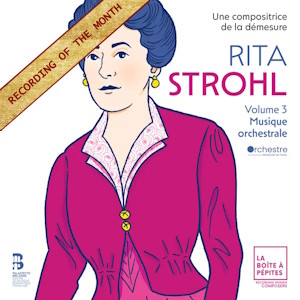
Rita Strohl (1865-1941)
Volume 3: Orchestral Music
Symphonie de la Forêt
Les Cygnes
La Flûte de Pan
La Momie
La Cloche fêlée
Yajnavalkya: Prelude to Act II
Marie Perbost (soprano), Lucile Richardot (mezzo)
Orchestre de l’Île-de-France/Case Scaglione
rec. 2023, Maison de l’Orchestre national de’Île-de-France, Paris, France
Reviewed as WAV files
La Boîte à Pépites BAP10 [74]
There is something irresistible about a labour of love. Everything about this release speaks of care and devotion to the cause of the forgotten music of French composer Rita Strohl. The liner notes themselves could form the basis for a full blown biography with their depth of research and passion for their subject. With so many neglected composers emerging blinking into the daylight at the moment, one could be forgiven a healthy scepticism about yet another one. The test should not be is Rita Strohl an unjustly neglected female composer but rather is her music worth performing, recording and hearing? I am happy to say that in the case of Rita Strohl the answer is an emphatic Yes.
This present release is actually Volume 3 of three recordings devoted to her music and I have chosen to begin with it as I suspect many listeners will prefer to start with Strohl’s orchestral music rather than the previous two which covered her output for chamber music and voice respectively. I have also chosen to start here because she wrote exceptionally well for orchestra. There is absolutely zero need for special pleading for music that shimmers and entices in a sensual and rather Gallic manner. For reasons that seem odd to me, Strohl’s music is, if it is mentioned at all, described as Wagnerian. I presume that this moniker derives from her unperformed septet of operas for which she attempted to build her own theatre. Her music might best be thought of as proto Debussy though most of the scores included here in fact precede Debussy’s Pélleas. A rather neat summary of the character of her music is contained in a phrase from the liner notes which references its “formes vastes et les effectifs larges.” I don’t think a translation is required. There is a sense in her writing of vast open spaces filled with light and air underpinned by a deist sense of spiritual connection with the natural world.
The opening of her long but gloriously languid Symphonie de la Forêt, the most substantial piece included, demonstrates her fine ear for sonority combined with a genuinely symphonic sense of scale and a piquant knack for a memorable phrase. Listening to the light as a soufflé and as transparent as a silk veil textures of this score we couldn’t be further from Wagner. Good though the playing Scaglione draws from his fine regional French band is I couldn’t help myself but dream of what Monteux might have done with such writing. There are big, slow moving climaxes in the outer movements where the mood is transportative rather than dramatic.
The other wholly orchestral piece included is an even more tantalising offering as it gives a glimpse of the terra incognita of Strohl’s operas. Given her facility at writing for the voice and her consummate scoring, it is safe to assume they contain music of the highest quality – an assumption borne out by the lengthy prelude to her Hindu inspired epic Yajnavalkya. This is conceived on an even more ambitious and mystical scale than the Symphonie. New label La Boîte à Pépites have already done Strohl proud – to ask for an opera recording is probably too much for the resources of a small label. I can though dream!
The rest of the disc is filled out with Strohl’s gorgeous orchestral songs. They occupy a place somewhere between Cantleloube’s once famous Chants D’Auvergne and Debussy though Strohl likes occasionally to introduce a bit of bite to her orchestrations which render them inimitably her own. They are sung idiomatically by the two soloists with only the occasional hint of strain in Perbost’s top end at their ecstatic climaxes.
As I indicated earlier, performances are first rate in the best modern sound. There is no pretending that the Orchestre National de l’Île-de-France (though they play amazingly well) are the Berlin Philharmonic but hopefully the passionate advocacy of all involved will lead to Strohl’s gorgeous music finding its way into the repertoire of the world’s biggest orchestras. Given the recent fortunes of Florence Price stranger things can happen.
This particular labour of love cannot be faulted.
David McDade
Buying this recording via the link below generates revenue for MWI, which helps the site remain free


















